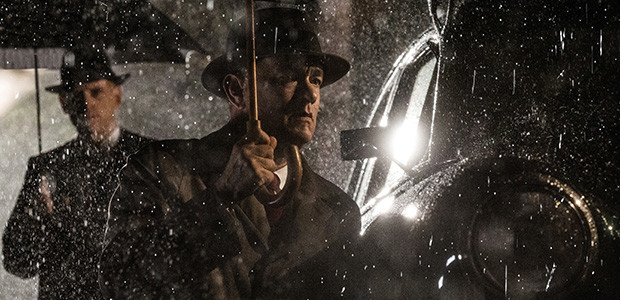Bridge of Spies revels in the kind of rich period details that Spielberg is known for. From it’s dizzying opening, set during a chase in the subways of New York in the late 50’s, to it’s conclusion in Berlin five years later, the film is a master class in combining elements of the thriller genre with good old-fashioned drama, held together by a warm tale of friendship and mutual respect.
The story of an American lawyer James Donovan (Tom Hanks) who is given the unenviable task of defending in court a Russian spy during the height of the Cold War, Spies finds inspiration in the visual storytelling of film noir, where men in fedoras and trench coats follow each other in rain soaked streets but also in classical tales of human goodness and the prevalence of justice found in stories such as To Kill a Mockingbird and 12 Angry Men. Though Spielberg may have perfected his set up of court scenes for dramatic effect in the bloated Lincoln, it is here that he finds grace in executing them for the purpose of moving the story along. Thankfully Tony Kushner, the writer of Lincoln, had nothing to do with this film, and so, with scripting help from the Coen Brothers, neither the screenplay nor the dialogues feel uptight or sanctimonious about history. In fact, the script is very witty, with wry humour, thick in innuendo, punctuating the otherwise serious tone.
Somewhere along the tale, the Germans get involved with the Russians and the films third act really sets the stakes high when a prisoner swap needs to be conducted, for which Donovan acts as the chief orchestrator. This is when the film shifts to East Berlin, during the period when the Wall was being constructed and the setup allows Spielberg and longtime collaborator Janusz Kaminski the chance to explore (and show) this very fascinating period in a very purposeful way. Aiding in no small measure is Michael Kahn’s stupendous editing, which holds our attention, while Spielberg’s precise, exacting, mise-en-scène provides exhilarating beauty and revelatory details.
Hanks portrayal of Donovan is not just confidently handled, it feels a natural extension of the actor playing him. You can tell just by his gestures what a consummate professional Hanks truly is, using his enormous onscreen charm and charisma to disarm the enemy, put allies at ease and convey the message with the right dose of diplomacy. This isn’t just the good fortune of a someone who has landed a great gig with a big name director, but the expertise of a performer who effortlessly delivers his lines and makes it seem all too easy.
Spielberg is often accused of being derivative in his themes and his manipulations of audience expectations (and sometimes emotions). As I grow older, I find myself appreciating his less than cynical worldview. As one of the few filmmakers who continues to make intellectually stimulating films in thoughtful ways but without the prevalent nihilism found in much of the industry, Spies is both a reminder of how great he can be, with the right material and how magnificent his output is when paired with the right thespian.
Rating: 




